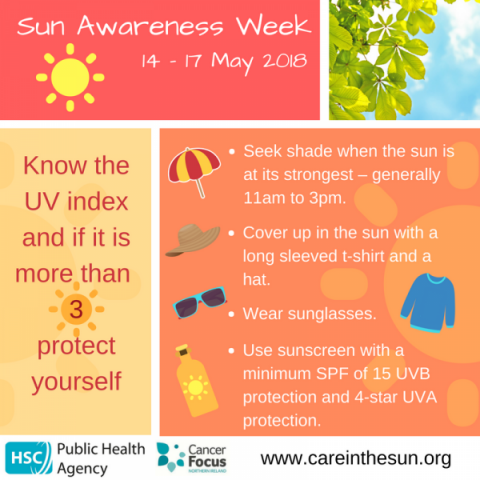Sun Awareness Week – be UV aware

During Sun Awareness Week (14 to 20 May 2018) the Public Health Agency (PHA) and Cancer Focus Northern Ireland are reminding people to be ultraviolet (UV) radiation aware and take appropriate care in the sun according to the UV level. To help with this they are launching a new online UV radiation awareness animation.
The Solar UV Index shows how much solar radiation is reaching us from the sun and how careful we need to be. UV levels vary with the seasons and time of day, but when the UV index is three or above we need to protect our skin and eyes, so it’s important to know what the UV index is going to be throughout the day.
In Northern Ireland we are exposed to UV rays between March and October, even on overcast days. The sun is particularly strong around the middle of the day, from 11am to 3pm. To explain how the UV Index works and how important it is to be UV radiation aware, the PHA and Cancer Focus NI have joined forces to launch a timely UV radiation awareness campaign, centred around a new animation.
The Be UV Aware animation highlights the need to take care if spending time outdoors through work, sports or leisure, either at home or abroad and to take the necessary precautions in the sun – seek shade, cover up, wear a hat, sunglasses and sun-cream – when the UV index is three or above.
Denise McCallion, Senior Health Improvement Officer at the PHA, explained: “With the weather eventually starting to warm up and people starting to wear lighter clothing, there is a need to remind everyone of the importance of sun safety and the need to be extra careful considering most of us will not have had any UV exposure during winter months.
“Being active and having fun outside is good for our health; not only can it lift our moods and allow us to get more active, but it provides vitamin D, an essential vitamin for everyone to help develop and maintain healthy bones, teeth and muscles. For most people just a few minutes’ exposure to the sun is enough to top up our vitamin D levels.
“However, the sun can cause permanent damage to our skin if we don’t take precautions. Just one episode of sunburn, especially in childhood, doubles the lifetime risk of malignant melanoma, the most serious form of skin cancer.”
Marbeth Ferguson, Skin Cancer Prevention Coordinator at Cancer Focus NI, said: “It’s important to remember the care in the sun messages both at home and abroad. Everyone is at risk of sun damage, but certain groups are particularly at risk, including those with fair hair and skin, babies and children, outdoor workers and people with a family history of skin cancer. This new campaign, based around our animation, reminds people to be UV aware and to take the necessary steps to protect ourselves in the sun and actively reduce the risks of skin cancer.”
There are a number of simple steps that will help protect against the sun’s harmful rays:
- Know the UV index and if it is more than three protect your skin and eyes.
- Seek shade when the sun is at its strongest – generally 11am to 3pm.
- Cover up in the sun with a long sleeved t-shirt and a hat.
- Wear sunglasses that have one of the following, CE and British Standard Marks, carry a UV 400 label and offer 100% UV protection. This will ensure they provide adequate protection from both UVA and UVB. Sunglasses should fit your face well and relatively snugly so that light doesn't enter your eye from around the lens.
- Use sunscreen with a minimum SPF of 15 for UVB protection and 4-star for UVA protection. Apply liberally 30 minutes before going out in the sun and re-apply at least every two hours.
You can find out what the UV index is for your area on the Met Office website at www.metoffice.gov.uk or check out the World UV app at www.bad.org.uk
You can view the UV radiation awareness animation at: https://youtu.be/H0nPZhma0lw
If you are concerned about skin cancer you can call the Cancer Focus NI free information and support Nurseline on 0800 783 3339 or email one of the charity’s nurses on nurseline@cancerfocusni.org
For more information and advice on how to protect your skin visit www.careinthesun.org
